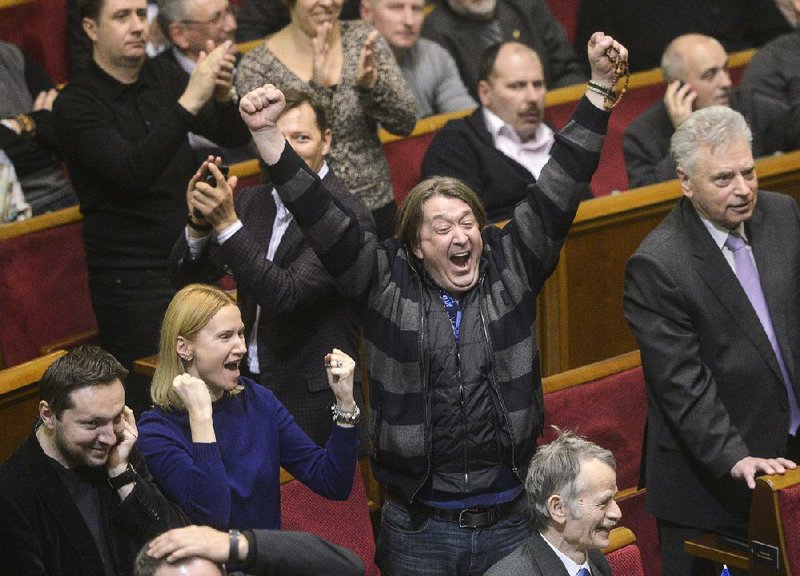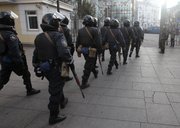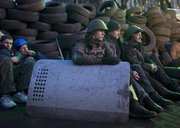KIEV, Ukraine - In a fast-moving day aimed at reshaping Ukraine’s political future, protest leaders and the president agreed Friday to form a new government and hold an early election. The nation’s parliament cut the powers of President Viktor Yanukovych and voted to free his rival, former Prime Minister Yulia Tymoshenko, from prison.
It was a crucial shift in Ukraine’s standoff between Yanukovych and protesters angry that he abandoned closer ties with Europe in favor of a bailout deal with longtime ruler Russia.
If it holds, the European-mediated agreement would be a major breakthrough in a months-long crisis over Ukraine’s identity. The standoff worsened sharply this week and left scores dead and hundreds wounded in the worst violence the country has seen since it became independent in 1991.
But not all sides embraced the deal. A Russian mediator refused to sign it, and a senior Russian lawmaker criticized it as being crafted to benefit the West.
And at the sprawling protest encampment in central Kiev, anger percolated among the thousands massed in the Ukrainian capital Friday night. Hardened protesters angry over police violence said they were determined to stand their ground until Yanukovych steps down.
The agreement signed Friday calls for presidential elections, originally scheduled for March 2015, to be held no later than December. It leaves Yanukovych in power until at least the end of the year - unless lawmakers use provisions under the constitutional change that would allow them to impeach him sooner.
Protesters booed opposition figures who went on a stage Friday evening to present the deal. One radical speaker threatened to go on an armed offensive if the opposition doesn’t demand the president’s resignation by this morning.
Others started chanting “Death to the criminal!” referring to Yanukovych.
Yuriy Korshenko, a lawyer and former judge who joined thousands of others near Kiev’s Independence Square, said Yanukovych must leave office immediately “or he will end up like Ceausescu and Gadhafi.”
The former Romanian and Libyan dictators, Nicolae Ceausescu and Moammar Gadhafi, were killed in bloody uprisings. “If Yanukovych were a man of honor, he would have already shot himself,” Korshenko said.
Addressing the protesters in Independence Square, opposition leader Vitali Klitschko tried to convince them that Yanukovych had likely given all he was willing to give.
“He’s not going to resign. This isn’t realistic. We have to think about realistic steps,” Klitschko said.
The U.S., Russia and the 28-nation European Union are deeply concerned about the future of Ukraine, a divided nation of 46 million. The country’s western regions want to be closer to the EU and have rejected Yanukovych’s authority in many cities, while eastern Ukraine favors closer ties with Russia.
Hours after the deal was signed, Ukraine’s parliament voted to restore the 2004 constitution, which limits presidential authority, clawing back some of the powers that Yanukovych had pushed through for himself after being elected in 2010.
The parliament then voted to fire the interior minister, Vitali Zakharchenko, who is widely despised and blamed for ordering police violence, including snipers who killed scores of protesters Thursday in Kiev.
The next order of business was Tymoshenko.
Legislators voted to decriminalize the count under which she was imprisoned, meaning that she is no longer guilty of a criminal offense.
“Free Yulia! Free Yulia!” legislators chanted.
The charismatic heroine of the 2004 Orange Revolution - which also drove Yanukovych from the presidency - Tymoshenko served as prime minister and narrowly lost the 2010 presidential election to Yanukovych. The next year, she was arrested and sentenced to seven years in prison on abuse-of office charges that the West has denounced as a political vendetta.
The 310-54 vote on her fate is veto proof, but Yanukovych must still sign that bill into law, and then Tymoshenko’s lawyers would have to ask the court for her release from prison in the eastern city of Kharkiv. The English-language website of The Kyiv Post newspaper quoted a lawyer for Tymoshenko, Serhiy Vlasenko, as saying the process could take up to two weeks.
Tymoshenko would be able to run for office after her release, since she would have no criminal record.
Meanwhile, with Yanukovych’s supporters quitting his party one after another throughout the day Friday, legislators also approved an amnesty for protesters involved in violence. The amnesty absolves those in custody or under investigation and prohibits future prosecutions of the protesters.
Ukrainian authorities will now name a new unity government that includes top opposition figures within 10 days.
The deal was a result of two days of diplomacy by top diplomats from Germany, France and Poland, who talked with the president and the opposition throughout the night Thursday.
White House press secretary Jay Carney said the deal is consistent with what Washington was advocating and that the U.S. will closely monitor whether it is fulfilled, holding out the threat of more sanctions if it’s not. The U.S already imposed visa restrictions against some members of the Ukrainian government.
“The agreement is a necessary compromise in order to launch an indispensable political dialogue that offers the only democratic and peaceful way out of the crisis that has already caused too much suffering and bloodshed on all sides,” European Union President Herman Van Rompuy said.
But neither side won all the points it sought, and some vague conditions have the potential to ignite disputes down the road.
The deal calls for protesters to hand over all their weapons, withdraw from buildings they have occupied and take down the camps they have erected around the country.
Thousands of protesters are camped out in Independence Square, also know as the Maidan. Most made no move to leave after the deal was announced.
“Resign! Resign! Resign!” they chanted.
“The Maidan will stand up until Yanukovych leaves,” said protester Anataly Shevchuk, 29.
“I hope that the direction of the country changes, but so far the goals of the Maidan have not been achieved,” said Kira Rushnitskaya, a 45-yearold protester. “Yanukovych agreed to give up powers to stay in power overall.”
The agreement did not set a deadline for leaving the camp, and many protesters are expected to move out slowly because of their distrust that the deal will be implemented.
Radoslaw Sikorski, the Polish foreign minister and part of a European team that has been pushing for a settlement, said a council representing some protesters in Independence Square had endorsed the hard-fought deal in a vote, with 34 voting infavor and two against.
Arseniy Yatsenyuk, one of three opposition members of the parliament who signed the accord with Yanukovych, acknowledged that it might not go down well with protesters who want Yanukovych gone, but said they could be persuaded.
“We need to explain, and we need to not only explain, we need to act,” he said after marathon negotiations at the presidential administration building. “People will never trust any kind of signature. People will trust real action.”
The accord’s fate hinges on the official opposition’s ability to control the most radical anti-government activists.
“The guys with the petrol bombs and the guns aren’t accountable to the opposition leaders who signed this agreement,” said Andrew Weiss, vice president for studies at the Carnegie Endowment for International Peace. “Whether they can drive events on the ground back into the kind of awful clashes we’ve seen this week is really the big question mark at this point.”
Shots were heard Friday morning, a day after the deadliest violence in Ukraine’s post-Soviet history. It was unclear who was targeted and whether anyone was hurt.
The leader of a radical group that has been a driver of violent clashes with police, Pravy Sektor, declared Friday that “the national revolution will continue,” according to the Interfax news agency.
Meanwhile, Leonid Slutsky, a Russian lawmaker who is chairman of the committee in charge of relations with other ex-Soviet nations, said Friday that the agreement serves the interests of the West.
“We realize where and by whom this agreement has been written. It’s entirely in the interests of the United States and other powers, who want to split Ukraine from Russia,” he said.
Russia’s Foreign Ministry issued a statement saying Russian mediator Vladimir Lukin’s refusal to sign the deal doesn’t mean that Russia isn’t interested in looking for a compromise to end the bloodshed.
“We will stand ready to continue helping Ukrainians normalize the situation if they ask for it,” it said.
It said Ukrainians should take into account all regions in its political transition - referring to the areas in Ukraine’s east and south that have close economic ties to Russia and where some see the protesters as puppets of the West.
In addition to anger over the failed EU deal, the country’s protesters have expressed anger over corruption in Ukraine; a lack of democratic rights; and the country’s ailing economy, which barely avoided bankruptcy with the first disbursement of a $15 billion bailout promised by Russia. The recent violence has added to Ukraine’s economic troubles.
Information for this article was contributed by Maria Danilova, Yuras Karmanau, Jim Heintz, Efrem Lukatsky, Yuri Uvarov, Angela Charlton, Vladimir Isachenkov, Frank Jordans and staff members of The Associated Press; by Andrew E. Kramer, Andrew Higgins, Oksana Lyachynska, Steven Erlanger, Michael R. Gordon, Dan Bilefsky and Steven Lee Myers of The New York Times; and by Kateryna Choursina, Daryna Krasnolutska, Ilya Arkhipov, David McQuaid, Ian Wishart, Henry Meyer and Nicole Gaouette of Bloomberg News.
Front Section, Pages 1 on 02/22/2014



